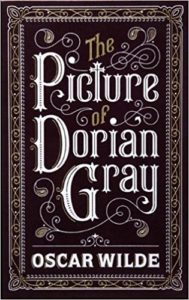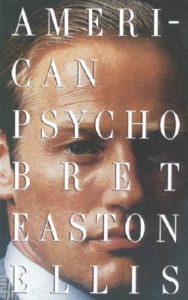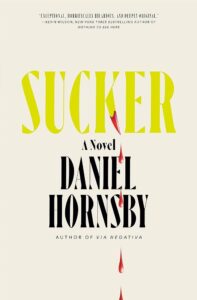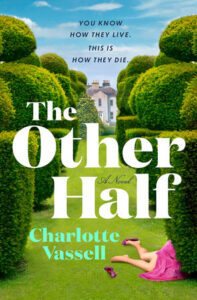Having money offers many privileges. Beautiful clothes, houses, and spouses. Glossy lives, glossy hair, and the odd glossy-coated pony. Better healthcare and a better diet full of perfectly balanced macro and micronutrients. The rich may live longer, but they are not immortals. They are not untouchable. The Other Half, my debut novel, features a love-to-loathe antagonist called Rupert Achilles de Courcy Beauchamp. Rupert is the epitome of a very English sort of privilege, but also the emotional desolation that such wealth afflicts. His only living family is a distant grandfather (former MP and current Baronet), he was abandoned at boarding school at seven and just thoroughly unloved. Rupert would be pitiable if he weren’t an absolute wanker. His gorgeous, Instagram-influencer girlfriend Clemmie goes missing on the night of his 30th birthday party that he’s hosting in the children’s party area of a London McDonald’s (black tie and BYOC). Clemmie’s body is found the next day on Hampstead Heath by DI Caius Beauchamp (definitely not a relation, his surname the assumed legacy of both families ‘involvement’ at opposite ends in the slave trade). Rupert looks like he did it, he acts like it too. Caius and his team have to prove that this pompous posho had the opportunity as well as the motive, but he has a room full of alibis saying it couldn’t have been him. Will Rupert get away with it, or will his wealth insulate him from the consequences of his actions?
Here are my some of my favorite wealthy miscreants who think they can but don’t always get away with murder, although sometimes they do.

The Picture of Dorian Gray, Oscar Wilde
Beloved by teenagers going through something—I speak from experience—Oscar Wilde’s only novel is a meditation on the evils of a life devoted to the selfish pursuit of beauty and earthly sensations. Dorian Gray is a libertine who despite his ways has not aged a day, but his portrait hidden in the attic has, and is unidentifiable to even the artist. Dorian has a growing body count: Sybil Vane, an actress he loved and then abandoned, her vengeful brother James, the painter Basil who begs Dorian to repent before he murders him after blaming him for his fate, and Alan Campbell a scientist who Dorian enlists to dispose of Basil’s body who later commits suicide. I like the idea that the rich can only really be held accountable by the creepy art they buy.

The Great Gatsby, F. Scott Fitzgerald
F. Scott Fitzgerald’s Jazz Age classic is a novella full of terribly large fortunes and ill begotten gains. Gatsby himself amassed his wealth through bootlegging, but it is Tom Buchanan who I am concerned with. Gatsby pays for his illegal ways and presumptive social climbing (into bed with Daisy) with his life. Tom on the other hand tells a calculated little lie to his dead mistress’ husband resulting in his rival’s death and the preservation of the old order. Gatsby is dead and Daisy hasn’t left Tom. Tom got away with it.

American Psycho, Bret Easton Ellis
Brett Easton Ellis’s classic violent and vicious capitalist horror is one of the only novels I have had to read in installments. I had to put it down and have a calming cup of tea after reading the part where murders a child at the zoo. Patrick Bateman’s crimes become more and more grotesque as his proclivities escalate into ‘isms’ that I dare not mention while containing acute analysis of pop culture (the chapter on Whitney Houston has stuck with me) and the exceeding banality of being wealthy in a hyper-consumerist world. The genius of Ellis’s work is that I couldn’t tell you whether Bateman got away with. Did he murder his colleague? He’s adamant he did but his colleague says that he had dinner with him London. Was it murder or just mania?

Sucker, Daniel Hornby
Daniel Hornby’s 2023 novel Sucker is the tale of Chuck, a trust fund baby (although he tries hard to hide it) who secretively runs his punk label with his father’s money. When the money tap gets turned off, Chuck luckily reconnects with Olivia, an old friend from college and takes a made-up sounding position at her company. Olivia is a biotech, dropout wunderkind and is aiming for immortality with her new technology, but then employees start going ‘missing’. Was Olivia reappearing when she did really luck, or bad timing? Hornby’s satire is the perfect send up of both the ultra-wealthy and tech start-ups, with just the right amount of added horror.

The Secret History, Donna Tart
I hate to admit it but I had a little bit of a crush on Henry Winter when I read The Secret History for the first time – me and half of BookTok. There’s something about a man who can read Ancient Greek and is charismatic enough to somehow convince his friends to murder their buddy Bunny to stop him from revealing that he murdered a farmer in a supposed re-enactment of bacchanalic frenzy. Classics as a subject is the preserve of the rich (in the UK at least this definitely true) and I don’t think it does them any good to be so well educated. Poor Henry is never caught, but he doesn’t get away with it.
***
